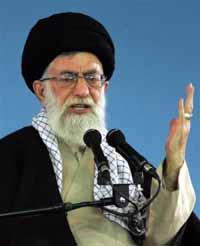Iran's spiritual leader supports talks with U.S. on Iraq
Iran's spiritual leader, Ayatollah Ali Khamenei, on Wednesday said he supported U.S.-Iran talks in Baghdad about improving Iraq's security, state-run television reported.

But he warned that the talks would only focus on American responsibilities in Iraq - not Iranian influence in its neighboring country - and said they were not a change in Tehran's policy toward Washington.
"The talks will only be about the responsibility of the occupiers in Iraq," the broadcast quoted Khamenei, who has final say on all state matters, as saying.
"They think that Islamic Republic has changed its firm, logical and defendable policy in rejecting negotiation with the U.S. They are wrong," he was quoted as saying during a speech to a group of clerics in Mashad city, about 1,000 kilometers (621 miles) northeast of Tehran.
The two countries recently said they would hold ambassador-level talks about Iran's war-torn neighbor, Iraq. Although such talks are seen as a political turnabout, potential for real progress is low as tensions between Iran and the U.S. have continued to escalate.
Contacts between the countries have long been taboo, a status enforced by Iran's top leadership - made up of Shiite clerics - since the U.S. cut ties with Iran after the 1979 seizure of the U.S. Embassy in Tehran.
Khamenei said Iran's Foreign Ministry decided to talk with the U.S. only because Washington did not fulfill its responsibilities in Iraq and accused the U.S. of trying to topple the current Shiite-led Iraqi government.
"The Iranian Foreign Ministry, based on a request by Iraqi government, decided to remind the U.S. of its responsibilities and duties regarding security ... in a face-to-face negotiation and give them an ultimatum," he was quoted as saying. The broadcast did not elaborate or say what the ultimatum was.
But he stressed that Iran's stance on Washington was the same and would only change if the U.S. changed its policies. The broadcast came as dozens of Iranian hard-line students gathered Wednesday in front of the presidential palace in downtown Tehran and criticized the government's decision for holding talk with the U.S.
"How it is possible to negotiate with the arrogant, bullying, expansionist and colonialist government of the U.S., especially with the current bold, impolite and demanding leaders?" state TV quoted Khamenei as saying.
Baghdad has been encouraging Iran and the United States - the two countries with the greatest influence in Iraq - to talk.
Iraqi Foreign Minister Hoshyar Zebari, who met his Iranian counterpart Manouchehr Mottaki during an Organization of the Islamic Conference meeting in Islamabad, Pakistan on Wednesday, said the two discussed plans for talks between Iraqi, Iranian and U.S. officials in Baghdad and that they would take place "soon."
"I think this is a very good opportunity to ease the regional tension, to help the Iraqi government to succeed in its effort to stabilize the situation, and we had a very constructive and positive meeting," Zebari said.
Mottaki said the meeting was "fruitful" but declined further comment.
The U.S. accuses Iran of secretly trying to develop nuclear weapons and supplying Shiite militias in Iraq with roadside bombs used to kill U.S. troops. Iran denies the allegations.
During a trip to the region last week, U.S. Vice President Dick Cheney warned that the U.S. and its allies would prevent Iran from acquiring nuclear weapons and dominating the region. Iran has demanded the U.S. leave the Middle East.
Iran has stressed that it sees the U.S. military presence in Iraq as a serious threat to its security. More than 140,000 U.S. troops are in Iraq - with more expected as part of a stepped-up Baghdad security operation.
Subscribe to Pravda.Ru Telegram channel, Facebook, RSS!





